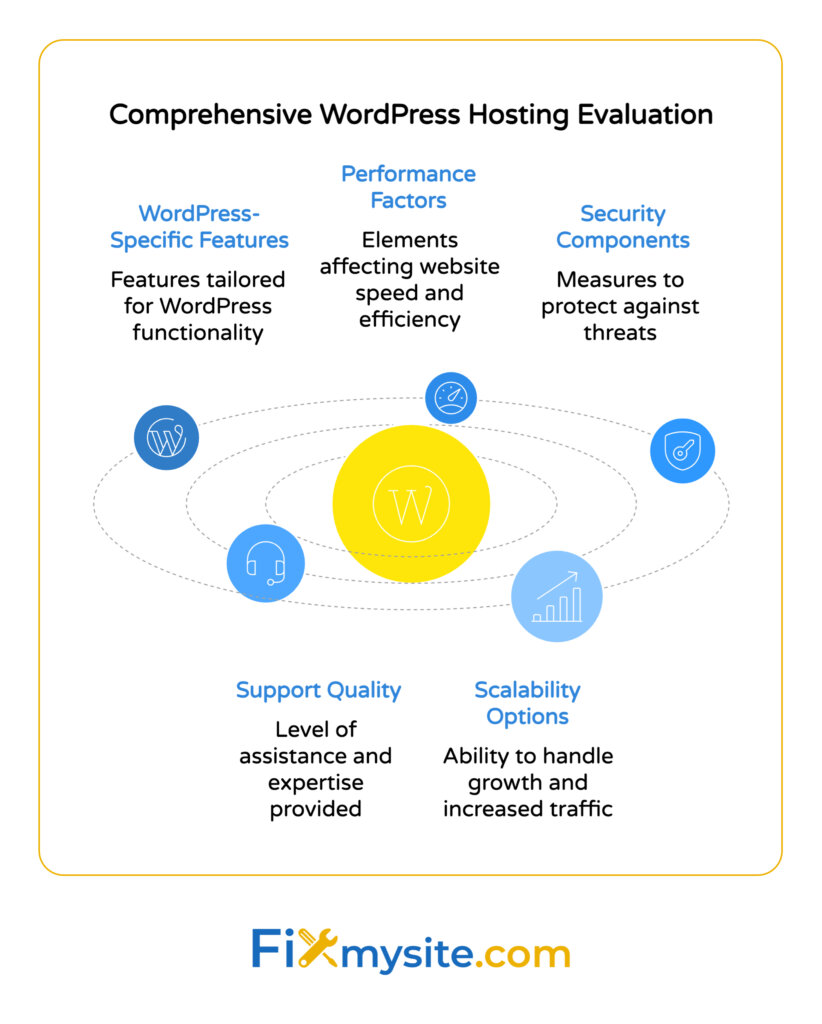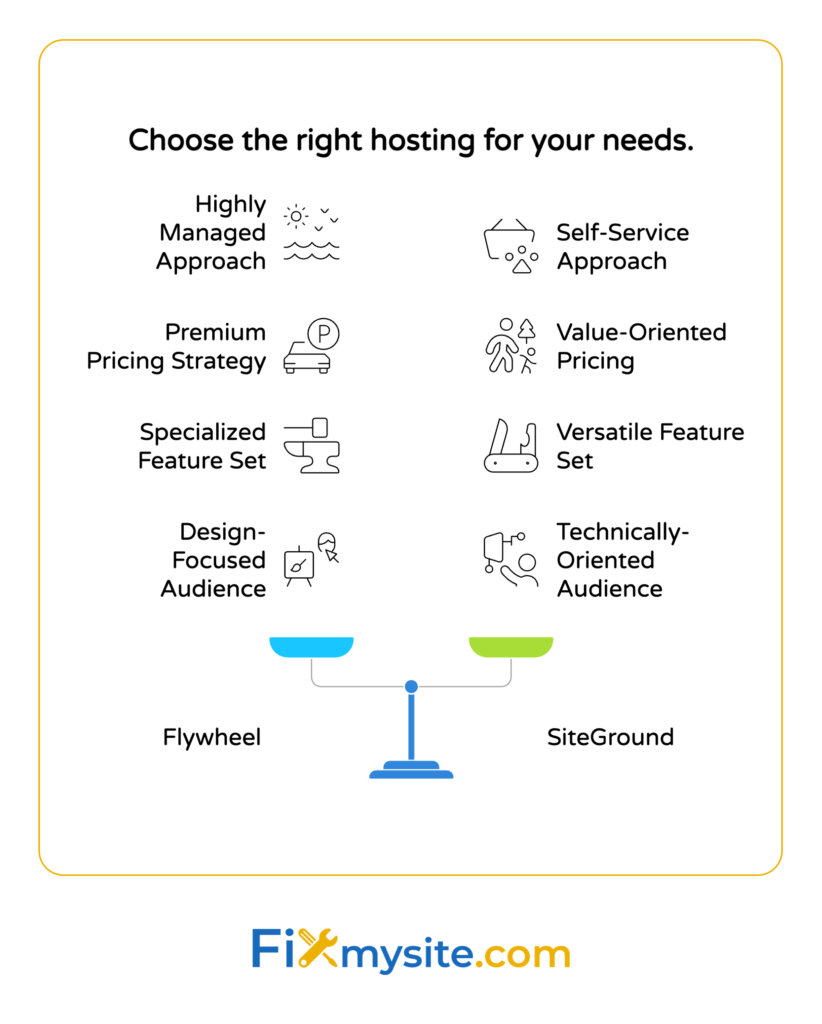
Choosing the right WordPress hosting provider matters deeply. Your decision affects your site’s speed, security, and overall performance. With so many options available, comparing Flywheel vs SiteGround requires careful consideration. This guide will help you make the best choice for your specific needs.
Both Flywheel and SiteGround offer WordPress-focused hosting solutions but with different approaches, price points, and feature sets. Understanding these differences will help you make a more informed decision for your website’s future.
We’ll analyze both providers across essential categories including pricing, features, performance, and support. By the end, you’ll have a clear picture of which host better suits your WordPress site.
What to Look for in WordPress Hosting

Selecting the right WordPress hosting requires understanding key factors. Not all hosting providers offer the same value, even when their marketing suggests otherwise. Focus on these essential elements when comparing options.
WordPress-specific features make a significant difference in your experience. Look for hosts that offer automatic updates, specialized caching, and WordPress-optimized server configurations. These features simplify management and improve performance.
Price-to-value ratio matters more than absolute cost. A slightly more expensive host might deliver substantially better performance and support. Consider the long-term value rather than just the monthly fee.
- WordPress optimization – Server configurations specifically tuned for WordPress
- Reliable performance – Consistent uptime and speed metrics
- Security features – Malware scanning, firewalls, and automatic backups
- Quality support – WordPress-knowledgeable staff available when you need help
- Scalability options – Ability to grow as your site traffic increases
With these factors in mind, let’s examine how Flywheel and SiteGround compare across these critical areas. Each provider has distinct strengths that may align better with your specific needs.
Flywheel Overview
Flywheel focuses exclusively on managed WordPress hosting. They target designers, agencies, and professional WordPress users who value simplicity and specialized features. Their platform emphasizes ease of use and workflow optimization.
The company positions itself as a premium WordPress solution. They offer a highly polished user experience with features designed specifically for WordPress professionals. Their approach centers on simplifying the technical aspects of WordPress hosting.
Flywheel’s managed approach handles core WordPress updates, security, and backups automatically. This allows site owners to focus on content and design rather than technical maintenance. Their dashboard offers a clean, intuitive interface specifically designed for WordPress management.
Flywheel’s Core Strengths
Flywheel excels in providing a streamlined experience for WordPress users. Their platform includes purpose-built tools for development workflows, client billing, and site management. These tools make Flywheel particularly valuable for agencies and freelancers.
The hosting environment uses dedicated resources rather than shared servers. This provides more consistent performance compared to traditional shared hosting options. Each site receives allocated resources that aren’t affected by other customers.
Their local development tool, Local by Flywheel, integrates seamlessly with their hosting. This creates a smooth workflow from development to production. The tool has become popular even among developers who don’t host with Flywheel.
SiteGround Overview
SiteGround offers various hosting services with specialized WordPress plans. They balance affordability with performance features typically found in higher-priced hosts. Their approach aims to serve both beginners and more experienced users.
The company provides officially recommended hosting by WordPress.org. This endorsement reflects their commitment to supporting the WordPress ecosystem. They actively contribute to WordPress core development and community events.
SiteGround operates on Google Cloud infrastructure, providing performance advantages. This modern infrastructure allows them to offer features like SSD storage and server-level caching. Their technology stack focuses on delivering speed and reliability.
SiteGround’s Core Strengths
SiteGround balances affordability with advanced features effectively. They offer performance optimization tools typically found only in more expensive hosting providers. This value proposition attracts both budget-conscious users and those seeking better performance.
Their custom-built Site Tools control panel streamlines website management. This interface replaces cPanel with a more modern, user-friendly approach. The design focuses on making common tasks more accessible for non-technical users.
SiteGround’s staging environment allows for testing changes safely. This feature, often missing from budget hosts, lets you clone your live site to test updates. Once verified, changes can be pushed to the live site with minimal risk.

Pricing Comparison
The pricing difference between Flywheel and SiteGround represents their different market positioning. This price gap reflects different service models and target audiences. Understanding these differences helps determine which provides better value for your needs.
Let’s compare the entry-level plans from both providers to understand the basic investment required. This comparison reveals significant differences in initial pricing. Flywheel’s entry-level plan costs $13.00/month for 1 website, 5GB storage, and 5,000 monthly visits. (Source: CyberNews)
SiteGround takes a more affordable approach to entry-level hosting. Their starter plan provides generous resources at a lower price point. SiteGround’s entry-level plan starts at $2.99/month with 10GB storage. (Source: CyberNews)
The following table provides a clear comparison of the pricing structures between Flywheel and SiteGround. This helps visualize the investment required for each option over different timeframes.
| Pricing Factor | Flywheel | SiteGround |
|---|---|---|
| Entry-level monthly price | $13.00/month | $2.99/month |
| Annual cost (first year) | $156.00 | $35.88 |
| Storage included | 5GB | 10GB |
| Websites allowed | 1 | 1 |
Annual pricing reveals even more dramatic differences between the providers. The total investment for the first year varies significantly. Flywheel’s annual pricing totals $156.00 for the first year, while SiteGround’s annual pricing totals $35.88 for the first year. (Source: ThemeIsle)
When considering pricing, remember that renewal rates often increase. Many hosts offer substantial discounts for the first billing cycle. Always check the regular pricing that applies after your initial term expires.
Features Comparison
Both hosts offer WordPress-specific features, but with different emphases. Their feature sets reflect their target markets and positioning. These differences may significantly impact your website management experience.
Examining the technology infrastructure reveals fundamental differences. The underlying technology affects performance, reliability, and scalability. SiteGround operates on Google Cloud infrastructure, providing modern performance advantages. (Source: CyberNews)
Flywheel takes a different approach to their hosting architecture. Their platform emphasizes WordPress optimization at every level. Flywheel provides managed WordPress cloud hosting with optimized servers specifically tuned for WordPress performance. (Source: CyberNews)
Let’s examine Flywheel’s entry-level plan features in detail. This provides insight into what you receive with their managed WordPress approach.
| Feature Category | Flywheel Tiny Plan Features |
|---|---|
| Storage & Bandwidth | 5GB SSD storage, 20GB bandwidth |
| Security Features | Free SSL certificate, Malware monitoring |
| Backup System | Automatic nightly backups |
| Development Tools | Staging sites, Local development tool |
| Performance Features | CDN integration, Server-level caching |
While we have detailed information about Flywheel’s features, the research material lacks specific feature details for SiteGround’s comparable plans. This makes a direct feature-by-feature comparison challenging in this particular area.
When choosing between hosts, consider which features matter most for your workflow. Developers may prioritize staging environments and Git integration. Content-focused sites might value automatic updates and simplified management interfaces.

If you’re facing technical difficulties with your current WordPress host, our WordPress support services can help resolve issues without requiring a complete host migration. Sometimes targeted fixes can improve performance without the complexity of moving providers.
Performance Comparison
Performance significantly impacts user experience and search rankings. Site speed affects visitor satisfaction, conversion rates, and SEO outcomes. Both hosts emphasize performance but through different approaches.
Server configuration plays a crucial role in WordPress performance. Specialized WordPress hosting typically includes optimized server setups. Both providers implement WordPress-specific optimizations, but with different technical approaches.
Let’s examine the performance-focused technologies each host employs. These technologies directly impact how quickly pages load and how the site performs under pressure.
| Performance Factor | Flywheel Approach | SiteGround Approach |
|---|---|---|
| Server Infrastructure | Managed WordPress cloud | Google Cloud Platform |
| Resource Allocation | Dedicated resources | Shared with resource guarantees |
| Caching Technology | Server-level caching | SuperCacher (multiple levels) |
| CDN Integration | Included | Available |
While both hosts offer strong performance features, their implementation details differ. These differences may impact real-world speed and reliability in ways that matter for your specific site.
Understanding WordPress page speed optimization techniques can help you maximize performance regardless of which host you choose. Many optimization steps remain under your control even with managed hosting.
With proper caching and optimization, you can significantly improve your WordPress site’s performance on either host. The right configuration can often overcome differences in base hosting performance.
Support and User Experience
Support quality can make or break your hosting experience. When issues arise, responsive and knowledgeable support becomes invaluable. Both hosts offer support, but with different approaches and specializations.
The user interface impacts your daily website management experience. A well-designed dashboard simplifies common tasks and reduces friction. Each host offers a distinct approach to their control panel and management tools.
Let’s compare the support options and user experience elements of both providers. These factors significantly impact your overall satisfaction with the hosting service.
| Support & UX Factor | Flywheel | SiteGround |
|---|---|---|
| Support Channels | Live chat, Email, Knowledge base | Live chat, Phone, Tickets, Knowledge base |
| WordPress Expertise | WordPress specialists only | WordPress-trained support team |
| Control Panel | Custom Flywheel dashboard | Site Tools (custom panel) |
| Client Management | Built-in client billing tools | Collaborator system |
Support responsiveness varies based on your plan level and the complexity of your issue. Premium plans typically receive priority support with faster response times. Basic plans may experience longer wait times during peak periods.
When evaluating support, consider the typical issues you encounter. If you’re comfortable with WordPress but need occasional help, basic support may suffice. Those who need frequent assistance might benefit from more comprehensive support options.
Best Use Cases
Different hosting providers excel in different scenarios. Understanding the ideal use cases helps match your needs with the right provider. Let’s explore which situations favor each host.
Flywheel works best for specific user profiles and needs. Their managed approach and agency-friendly features suit particular use cases. Consider Flywheel if you match these scenarios:
- Agencies and freelancers managing multiple client sites
- Design-focused professionals who want to minimize technical management
- Teams that value workflow tools like staging and local development
- Sites requiring consistent performance with dedicated resources
SiteGround serves different needs with its balance of affordability and features. Their approach works well for different user profiles. Consider SiteGround if you match these scenarios:
Decision Framework
When deciding between these hosts, consider these key questions. Your answers will guide you toward the most suitable option. Evaluate your needs honestly to find the best match.
Budget sensitivity often determines your initial options. If price represents a primary concern, your choice becomes clearer. Budget-conscious users typically find SiteGround’s lower entry point more accessible.
Technical comfort level impacts which host will feel more appropriate. Users with different technical skills may prefer different management approaches. Flywheel’s highly managed approach removes more technical burdens but at a higher cost.
Consider whether you need specialized development workflows. Some projects benefit significantly from specific tools and environments. Flywheel’s development-friendly features like staging and Local may justify the higher cost for certain workflows.

WordPress Migration Considerations
Moving to a new host requires careful planning. Migration involves several steps that must be executed properly. Understanding the process helps ensure a smooth transition.
If you’re planning to migrate your WordPress site, choosing the right host is crucial. The migration process varies depending on your destination host. Both Flywheel and SiteGround offer migration assistance, but with different approaches.
How to migrate your WordPress site without experiencing downtime is a common concern for website owners. Professional migration services can minimize disruption during the transition process.
The following table outlines migration options for both hosting providers. This comparison helps you understand what assistance is available when moving your site.
| Migration Factor | Flywheel | SiteGround |
|---|---|---|
| Free migrations | One free with new account | WordPress Migrator plugin |
| Migration process | Handled by Flywheel team | DIY with guided tool |
| Additional migrations | Paid service | Paid service |
| Typical timeframe | 1-3 business days | Same day (DIY) |
When planning a migration, create a complete backup first. This precaution protects your site if anything goes wrong during transfer. Keep your original hosting active until you’ve verified the migration’s success.
For complex WordPress sites with custom configurations, consider professional migration assistance. Our WordPress migration services can ensure a smooth transition without data loss or extended downtime.
Conclusion
Both Flywheel and SiteGround offer quality WordPress hosting with different strengths. Your specific needs and priorities will determine which provider offers better value. Consider your budget, technical requirements, and growth plans.
Flywheel provides a premium, highly-managed WordPress experience. Their platform excels for agencies, freelancers, and those who value workflow tools. The higher price delivers a more streamlined experience with fewer technical demands.
SiteGround offers an excellent balance of affordability and features. Their approach works well for budget-conscious users who still need solid performance. Their Google Cloud infrastructure provides modern performance at a more accessible price point.
Whichever host you choose, proper WordPress maintenance remains essential. Regular updates, security monitoring, and performance optimization help ensure your site runs smoothly. For help with ongoing WordPress maintenance or migration challenges, our WordPress support services provide expert assistance when you need it most.



